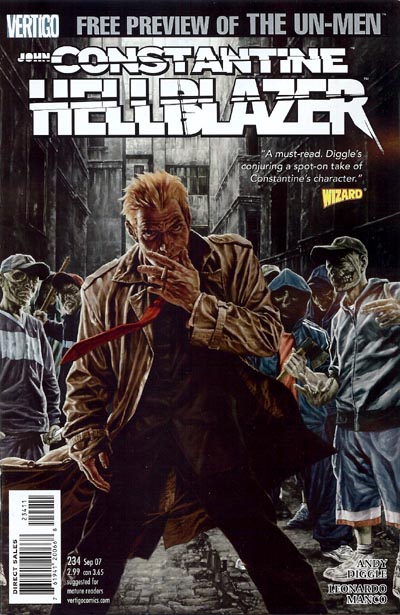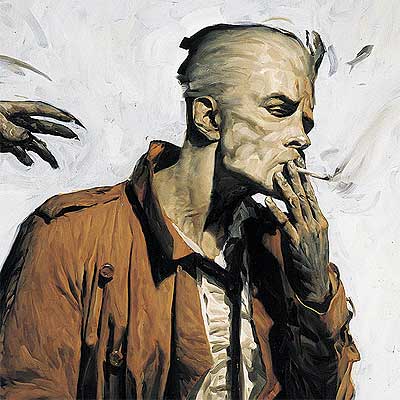
Woody Allen is a legendary filmmaker, to be certain. But he’s also a filmmaker who is perceived to have had a golden age, a period where the movies he made were head and shoulders above the things that he makes now. That’s not such a great place for an artist to be, but Woody managed to shut up a lot of his critics withMidnight in Paris.
It’s not only one of Allen’s most financially successful films, it’s also one of his most critically acclaimed, and it’s been held up as proof that we might be in the midst of a Woody comeback. Is it really worthy of all the hype though? Lots of people love this movie—like me—but it’s also a film that has glaring flaws. What is it aboutMidnight in Paris that makes our Internet culture, that is so quick to tear everything down with snark, give it such an easy pass?
Back in 1989 Bill & Ted’s Excellent Adventure was also a huge success. It made so much money that it spawned not only a sequel, but also an animated series, video games, and who knows how many other kinds of merchandise that time forgot. Yet, despite this success, it’s not a film that many people take seriously. There’s a love for it still, but one that seems more ironic than anything else.
Why is that so, when there’s so much respect for the other big genre hits of the 80s? Why doesn’t this film get a fraction of the attention that another 80s era time travel movie, Back to the Future, gets?
What do they have in common?
These are both films that feature protagonists who are having trouble making their way in the artistic world. InMidnight in Paris we’re introduced to Gil (Owen Wilson), a Hollywood hack who isn’t sure if he’s going to be able to make a transition into doing legit writing. And in Bill & Ted it’s two high school kids (Alex Winter and Keanu Reeves) who know that they’re destined to front a legendary rock band, but who have no idea how they’re going to get there.
Strangely enough, given the films’ differing tones, the characters in both end up finding their way in similar fashions: time travel voodoo leads to them interacting with famous historical figures, and the insights that come from such unlikely tête-à-têtes lead to life lessons. Also, from Ernest Hemingway speaking solely in his famously curt prose, to Napoleon Bonaparte developing a love of water slides, both films are full of sly, intellectual references.
Why is Midnight in Paris overrated?

This is a movie that preys on the deep love so many people have for the city of Paris. Much has been said about the opening montage, how beautiful it is, and how it sets the mood for this film perfectly; but what is it other than a series of street shots of Paris? It’s the city that’s affecting us here, not anything done by the filmmaker. Allen is piggybacking off of affection that we already have in order to manipulate a reaction. As a love letter to the city it works great, but indulging in imagery that millions of people all over the world have loved for centuries shouldn’t be lauded as if it takes any particular skill, or as if it’s one of Allen’s great accomplishments. Here he’s less an artist creating something new and more a puppet master manipulating what was already there.
Something should be said of the intellectual currency that comes from loving Paris, as well. It’s a city of art and culture, and having knowledge of it is a sign of sophistication. Similarly, understanding the myriad references this movie makes to the art and literature of the 20s is a sign of intellectual achievement. Are we so willing to ignore this movie’s flaws because it’s the sort of material that makes us feel accomplished to connect with? I mean, this is a film where you practically have to have degrees in art and literature to understand any of the jokes. It’s exclusive and snooty, something meant to fly over the heads of most audiences while the rest of us smugly chuckle. There’s something to be said for not pandering to the lowest common denominator, but Midnight in Paris callously leaves as many people behind as possible.
Allen cheats a bit as far as his thematics go as well. Midnight in Paris is supposed to be about the realization that you’re better off making the best of your current situation rather than wallowing in nostalgia… so why do nearly all of the film’s pleasure come from said wallowing? All of the scenes set in the present feel like afterthoughts. The modern characters are two-dimensional and off-putting. Gil’s fiancé Inez should be an important character in this story, especially since she’s played by such a talented actress (Rachel McAdams), but instead all we get is a shallow, sniping, chore of a woman. And this film is never more simple and pandering than in its Ugly American portrayal of her right wing parents; they’re nuance-free caricatures of Phillistinism, and all of the time we spend with them feels like time wasted.
That the rich, beautiful, interesting scenes set in the 20s feel so magical by comparison should come as no surprise. I’ve maybe never seen a movie that makes me want to live in the past more than this one.
Why is Bill & Ted’s Excellent Adventure underpraised?

Bill & Ted is viewed as a goofy comedy for kids that can only really be appreciated when served alongside a heaping helping of nostalgia for the era in which it was made. It’s more than that. The level of storytelling brought to the film makes it a timeless classic that could be enjoyed anywhere and by anyone. Rather than just being a series of historical gags or a satire of late 80s pop culture, Bill & Ted is an against the odds tale about a couple of underdogs that’s very effectively told. Very early on in its runtime we’re introduced to what’s at stake here. These relative idiots need to somehow put together the perfect history report, they only have a limited amount of time to do it in, and if they don’t pull it off they’re going to flunk school and have to stop playing rock music. It’s tried-and-true storytelling structure that always works, and it predictably keeps us engaged.
The characters here are rich and nuanced enough that we always feel empathy for them, as well. Midnight in Paris features some idiotic characters, but they’re two-dimensional jerks that we’re supposed to feel good making fun of. That’s not the case here. We’re always laughing along with Bill & Ted, not at them. And though they are a couple of the dimmest bulbs ever put on film, they’re good natured and earnest enough that you end up loving them anyway. Somehow this movie gives us a warm portrayal of the simpleminded without ever glorifying ignorance. It’s like Forrest Gump with teenagers. And because we like the kids so much, the historical figures get used as color for their story and not as the main attraction like they are in Woody’s film.
The best thing about Bill & Ted is its good heart and sense of fun. Its stupid notion that loving music can create peace on Earth is simply infectious. And the way it takes a couple of shallow, thoughtless teenagers and teaches them to appreciate a history lesson is just heartwarming. It plays as the polar opposite to Midnight in Paris’ snooty intellectual exclusion. Bill & Ted isn’t longing for an intellectual ideal that never existed, it’s just holding out hope for how good the future’s going to be. And as charming as spending time with all of the 20s era expatriates in Midnight in Paris is, does it ever match the sheer joy experienced from watching Napoleon learn to love ice cream and water slides in late 80s California? I submit that it does not.
Evening the Odds
Despite the fact that Midnight in Paris is considered a high-minded work and Bill & Ted’s Excellent Adventure is considered a slight trifle, I can’t help but wonder which one is actually more academically important. Bill & Tedmakes references to the accomplishments of Joan of Arc and the methods of psychological analysis developed by Sigmund Freud.
Midnight in Paris, for its part, deals in cheeky references to the fact that Luis Buñuel directed The Exterminating Angel and that Salvador Dalí had a rhinoceros show up in a couple of his sculptures and paintings. When it comes down to it, which film’s jokes are really more high-minded? Which set of information would you rather your kids go into the world being aware of?











No comments:
Post a Comment